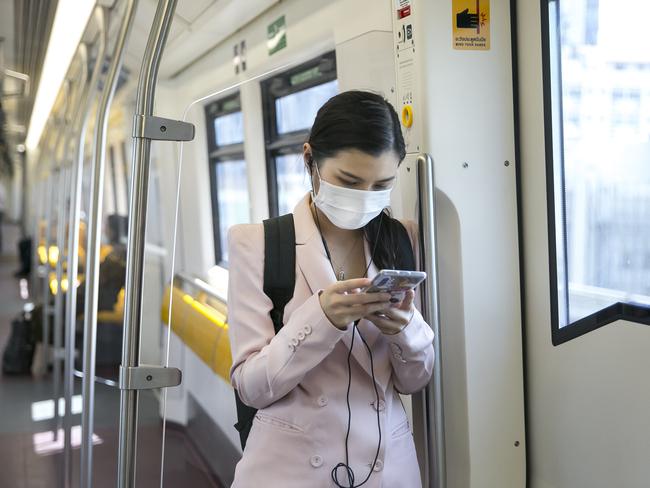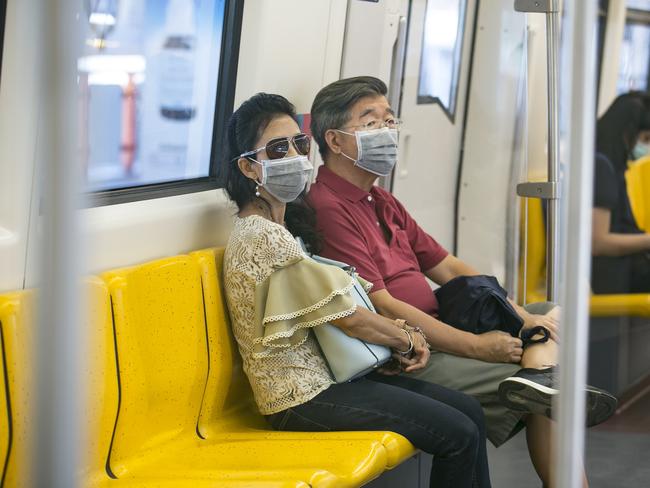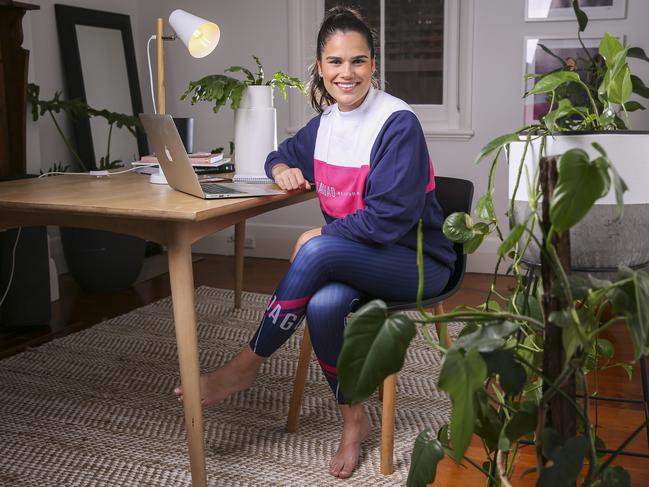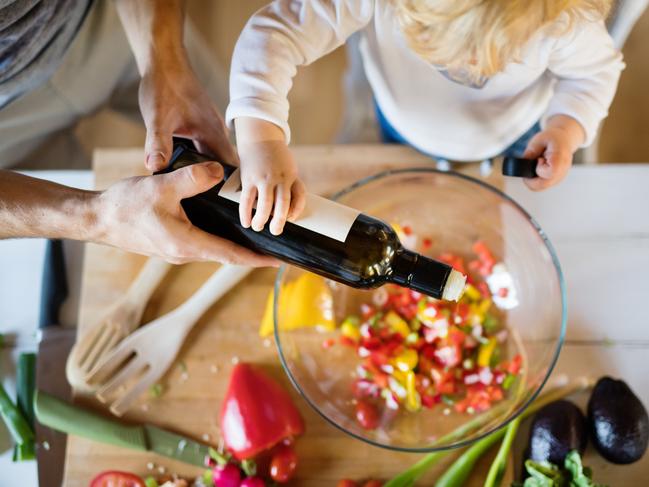How the deadly COVID-19 virus has changed modern life in 2020
It’s the pandemic that has completely overturned modern life. From working from home to socialising, this is how coronavirus has changed the way we live.

National
Don't miss out on the headlines from National. Followed categories will be added to My News.
Life has changed so much for so many in recent months that it can be hard to try to picture what comes next.
While there are undoubtedly tough times coming, as lockdowns and job losses bite – not to mention the huge health impact of the coronavirus – there is a growing awareness of the potential upsides to this unprecedented societal shift.
Regional centres could flourish as teleworkers move from expensive cities, employees will have better work-life balance and more bosses realise their remote workers are just as efficient, if not more productive, at home.
There is the potential for a post-war style baby-boom, who will perhaps be known as “the coronials”, while home-cooking Australians will be healthier.

MORE NEWS
Fashion’s big plan to tackle virus mask shortage
Megan and Harry have moved again
ASX is rising as Wall St surges amid COVID-19
The awareness that we are all in this together also points to an increase in kindness, say experts – while the visible benefits of less manufacturing pollution and little traffic are offering hope to some who felt there was nothing at all they could do to help fix the environment.
Economists also point to more conscientious consumption and a focus on lowering personal debt.
Where a flat screen TV may have previously been a reward purchase, shoppers are likely to instead treat themselves with more affordable luxuries.
Leading demographers, futurists, psychologists, economists and food identities talk to News Corp Australia about not only how to deal with the current challenges but how we can come out the other side, stronger and maybe even happier than we were.
BABY BOOM
While the increased time spent at home in quarantine has led to speculation of a baby boom in nine or so months, it’s likely it will take a little longer to happen, according to leading social researcher Mark McCrindle.
“When we can start to see a bit of hope on the horizon, that's when we will see more of a baby boom,” Mr McCrindle said.
“If we look at the war years, in the time when there was great uncertainty, there weren’t a lot of births, but towards the end of the war, not actually after the war, but towards the end, that’s when the baby boom began.”
The current financial uncertainty was likely to work against any instinct that home-bound families might have to grow.
“In this kind of crises, people do start to reprioritize and say: ‘it’s not really just about money and the next investment, it’s about leaving a legacy and family,’ and so it does get people to encourage to think about starting a family or having an extra child,” he said.
“But secure financials are a key determinant that people think through before having more children. And making sure that they've got a stable environment is a precursor to having children.”

AGE OF KINDNESS
Despite all the focus on unfortunate hoarding and fights over toilet paper, social media is filled with hashtags celebrating small kindnesses as people try to connect with others in the time of coronavirus.
“History shows that these crises get us out of our own silos. Like any global crisis, we realise we're all in it together. And we're in what’s like a survival mode as a community,” Mr McCrindle said.
“And yes, some people become individualistic, but not many.
“We see that with Australia in these tough times, whether it be drought or bushfires, whether it be national tragedies or whether it be like this, we come together.”
These acts of kindness also go a long way to helping preserve mental health, according to Dr Tim Sharpe, from The Happiness Institute.

“Especially at the moment, when so many are anxious and affected in many ways, it’s kindness, I believe, that will get us all through,” said Dr Sharpe, a positive psychologist based in Sydney.
“It’s kindness and compassion that connects us all, and there’s no doubt we’ll all get through this more easily and more effectively if we come together and support each other in whatever ways we can, with whatever resources we have.”
Dr Sharpe said despite the tough times ahead, it was possible to try to find some light.
“We’re already seeing inspirational acts of kindness and compassion and generosity, which is something positive,” Dr Sharpe said.
“We’re seeing workplaces and communities coming together and doing amazing things. We’re seeing benefits to the environment as a result of less travel. And we’re seeing people re-evaluate their priorities and feeling immense gratitude for things they’ve been taking for granted.
“So I would suggest that it’s possible to be both anxious and upset, and hopeful and optimistic; we can feel these complex emotions at the same time.”
FOOD
There’s no doubt the hospitality industry has taken a massive hit that will be felt for months, if not years, as restaurants and bars shutter.
This has seen a fast pivot from the editor of one of Australia’s top food publications, who says her site’s traffic “has never been bigger”, as home-bound readers search for inspiration and online social interaction.
“Everything we are doing now is to help people who are isolated,” says Delicious editor in chief Kerrie McCallum.
“All the things that you read about in the news of people shopping and stocking up on, now they want different ideas about what to do with those ingredients.
“People are cooking at home and eating at home a whole lot more. They are searching for things like immunity boosters.

“But they are also looking for things that give them a constant connection, and this is why social media is important.
And then there are the quirky things that make people laugh, like the ‘quarantini’ (just like a regular martini, but you drink it alone).”
“The flip side of that is that, you know, everyone's very worried about our restaurant industry, because people aren't going out.”
Ms McCallum suggested buying gift certificates for future meals to try to help, but also said the sector would likely need significant government support to rebound.
MONEY
More than eight in 10 Australians are worried about the financial hit they will take due to COVID-19, and research shows many are financially unprepared for an extended downturn.
Futurist Warren Hatch, from international superforecaster Good Judgement, said how long the recovery takes will depend on the length of the coronavirus impact.
“If the peak passes in the next couple of months, I suspect there'll be a huge sigh of relief, and there'll be a bit of a spending spree through the second half of the year by individuals and businesses,” Mr Hatch said.
“My recollection is that say after 911, there's there was a bit of an ‘Ah, well, okay, now I'm going to treat myself a little bit’.
“But if it's something that rattles on and continues and the uncertainty fails to abate, then I think that people will be much more cautious as a result, and instead of seeing a rebound in the second half of the year, we'll see an ongoing malaise and further need for government intervention.”
Financial expert Kirsty Lamont said Australians were already changing their spending habits.
“Our research has uncovered some real concerns about our ability to withstand the financial impact of the pandemic,” said Ms Lamont, a director at Mozo.
“Nearly half our respondents told us they're unable to work remotely if quarantines get imposed and 20 per cent of them can't afford not to work because they have no savings.”
Discretionary spending has already bottomed out “due to the changing lifestyle that we're already experiencing as a direct result of the pandemic”.
“I think we are moving into a period of frugal spending that will be concentrated on the home and home-based activities as they become the centre of our lives,” she said.
“But while we’ll see falling spending on travel and eating out and entertainment, that may be accompanied by a rise in spending on things like home office supplies, fresh food to cook at home, streaming services, exercise apps, and even home based activities like puzzles and board games, as we're seeking to make our new home bunkers more comfortable places.”
With experts pointing to a likely recession, many Australians might even change their approach to money.
“We know the Reserve Bank is going to be keeping the cash rate at an all time low
for some years. And that suggests that they believe that we are heading into a period of sustained recession,” Ms Lamont said.
“If that's the case, that is the sort of financial event that can cause people to change their financial habits over the long term.
“As we saw with things like the Great Depression, a whole generation of people took on a mentality of frugality and making the most of everything over their lifetimes, as a result of that experience when they were when they were younger.
“Serious financial events can make a long-term impact on people's spending and savings habits.
“And we hope Australians do turn towards more of a savings mentality. We know that one in five Australians currently don't have any savings. And that is a concern for people. And we would hope that that's something that people may hope to change as a result of this experience.”
Ms Lamont said cash-strapped Australians would be more likely to rule out big purchases in favour of smaller ones.
“Sales of smaller luxury items can actually increase. It's known as the lipstick effect where lipsticks across the country can sell out because people are finding less expensive ways to treat themselves,” she said.
HOW WE WORK
The biggest thing holding back bosses from letting significant staff numbers work from home has long been the sense that their employees wouldn’t get their jobs done.
Even though about 80 per cent of workers say they’d like to be home-based for at least part of their time, the option has long been considered a perk and used for staff retention.
Kate Lister, the president of Global Workplace Analytics, said the enforced quarantines of the coronavirus crisis would likely change workplaces forever.
“I think this is going to be a tipping point and the longer it goes on the more permanent it's going to become,” said Ms Lister.

“There is a perfect storm of factors that's coming together. One of the biggest predictors of whether a manager supports remote work is whether or not they have done it themselves, because it gets them over those issues of trust and not being able to collaborate.
“Once they've actually done it, they see that it actually works.”
Ms Lister said the crisis had accelerated “by many years” the widespread adoption of working from home.
“Right now we're kind of in crisis mode, and (saying) let's just all hunker down and make sure we can talk to each other. But I think shortly thereafter, it will become more formal,” she says.
“The thing is they should have had this in place for years, really. We’re already working remotely, whether we're nine floors, nine miles or nine time zones away. “You know, you're not going to go down to the second floor to talk to Joe, you're going to pick up the phone if you're on the fourth floor, or chat or email. And so you know, regardless of whether you're talking about working remotely out of the office, or in the same office, it is pretty much is the same thing.”
Remote workers also tend to be happier, she said.
“Something like 70 per cent of people say they can't be themselves at the office,” she said.
“That’s kind of sad. And, you know, we're suffering from a lack of empathy in the world. And I think the more we are ourselves and we allow our colleagues into our home and into our lives, the more empathetic we will become, and the more trusting we will become.”
There are also clear benefits for employers, including not having to pay for office space, and the fact employees tend to give back up to 60 per cent of their recovered commuting time.
“That’s one of the reasons for the increased productivity, but it's also a double edged sword,” she said.
“One of the problems people that work remotely have is overworking. Without those social cues of other people getting up and going to lunch or leaving or taking breaks, you tend to just work and work.”
But the biggest impact would be on cities, with real estate giant CBRE predicting the outbreak would permanently alter Asia’s commercial property market.
Teleworking would also open up far more affordable lifestyles out of big cities.
HOW WE MEET
Another permanent change may be in how people structure their social lives, according to Mr McCrindle.
“It’s hard for people who are alone at the moment, your anxiety is scary when it's not shared,” he said.
“And that normally for singles can happen through those social bottlenecks in which we engage in the workplace, maybe the drop off and pick out both of kids, all our other social activities, and with all of that being brought to a temporary halt those singles or single parents don't have another adult around to just relate to.
“So they will definitely be looking for alternative connections. Now, a lot of that is online. But I think once we're out of all of this, people will say: ‘You know what? I need other pillars, social pillars in my life, I can't rely on the workplace alone’.
“This will make people give priority to their social connections, both online and offline.”


